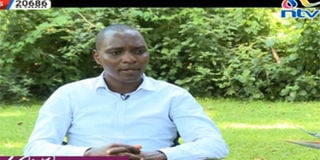Kiprop's sob story leaves more questions than answers in murky world of doping

A screen grab of Asbel Kiprop during his interview on NTV lifestyle show ‘Unscripted' on April 4, 2020. PHOTO | ELIAS MAKORI |
What you need to know:
- He also talked strongly about how he plans to fight to clear his name - if it was the last thing he would do.
Let me state from the outset that this piece is neither a condemnation of nor commendation for fallen track hero Asbel Kiprop.
Those of you who watched NTV’s weekly show “Unscripted” last Saturday evening or read this the “Big Interview” published by Nation Sport last Sunday will have, with front view seating, witnessed Kiprop’s baffling story.
He talked about how he was set up by people at Athletics Integrity Unit – a special unit established by World Athletics to tackle doping in the sport - who wanted to see him out of the sport, how his “fixed” positive test messed up his career, how his friends deserted him while his running colleagues ridiculed him. He also talked strongly about how he plans to fight to clear his name - if it was the last thing he would do.
It was a candid, open interview, straight from the heart and the head. His side of the story. A doping history case that raised more questions than answers.
For those not familiar with the case, Kiprop was banned for four years from May 2, 2018 after testing positive, out of competition, for banned blood boosting hormone Erythropoietin.
No way, said the former 1,500 metres world champion. How would he have cheated having been tested 136 times? How would he have cheated while he had publicly advocated for harsher punishment for dope takers? he posed.
My first thought after going through the interview was: Find me an elite athlete caught doping who readily confessed to his/her cheating ways and I will find you a normal man who hates sports.
Cases of high-profile athletes being busted for using performance-enhancing substances but who strongly deny the same are numerous, but I will just pick three.
One, Ben Johnson. The powerful running Canadian won the 1988 Seoul Olympic Games 100m in a new world record of 9.79 seconds, four hundredth of a second faster than his previous record of 9.83, and beating his bitter rival Carl Lewis – perhaps the greatest sprinter in the world after Jamaican speed freak Usain Bolt.
The supremely confident Johnson then had the temerity to say that he would have even run faster on that Seoul Olympic Stadium track had he not raised his hands in celebration moments before hitting the tape. He was disqualified three days later after testing positive for anabolic steroid stanazolol.
The Canadian promptly denied using steroids and continued to do so. However, while testifying before a Canadian government inquiry committee a year late Johnson admitted he had lied about using banned performance-enhancing substances.
Interestingly, Johnson’s coach Charile Francis, in his tell-all book “Speed Trap” states that the Canadian runner preferred using synthetic anabolic steroid furazabol. Francis goes on to posit that there is no way Johnson could have tested positive for stanazolol in that edition of the Summer Games.
Two, Lance Armstrong. The gifted American cyclists won the Tour de France a record seven times before he was stripped of all the titles over doping.
Armstrong was the subject of doping allegations for many years. Whispers first started of him using banned substance when he won the 1999 Tour de France after recovering from testicular cancer. He repeatedly denied use of banned substances even as he piled up one title after the other.
It was only in 2013, more than 10 years later, and amidst overwhelming evidence against him, that Armstrong publicly acknowledged his wide spread use of prohibited substances. His case is considered the biggest doping scandal in cycling history.
Three, Linford Christie. To my knowledge, the speedie Christie has never, ever admitted to taking drugs. The 1992 Olympic Games 100m men’s champion tested positive for the anabolic steroid nandrolone in 1999, and was banned for two years. Christie always pleaded his innocence and was even cleared by UK Athletics before World Athletics (then the International Association of Athletics Federations) stepped in to ban him.
For all we know, Kiprop may be innocent. Some school of thought considers these drug testing protocols as unfair to athletes, in the sense that when an initial sample tests positive the athlete is presumed guilty until proved otherwise. But that is a topic for another day.
Today, I am just left wondering, who would badly want to bring down Kiprop?





